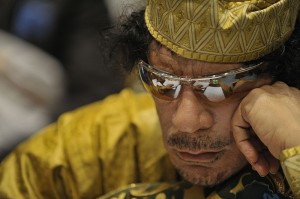Libya: What to do?
 As with Egypt, American sympathies instinctively side with Libya’s oppositional forces as they seek to overthrow the tyrant Qaddafi—and rightfully so. But where U.S. foreign policy is concerned, prudence is in order. This is especially the case considering that the Obama administration has evinced inconsistency, if not incoherence, regarding the Middle East: vowing not to “meddle” on behalf of Iranian dissidents, while eagerly disavowing onetime U.S. ally Mubarak; confidently stating that Mubarak’s authority was secure at the start of the revolution, even as he was toppled weeks later; and misguidedly being open to talking with existentialist enemies such as the Muslim Brotherhood.
As with Egypt, American sympathies instinctively side with Libya’s oppositional forces as they seek to overthrow the tyrant Qaddafi—and rightfully so. But where U.S. foreign policy is concerned, prudence is in order. This is especially the case considering that the Obama administration has evinced inconsistency, if not incoherence, regarding the Middle East: vowing not to “meddle” on behalf of Iranian dissidents, while eagerly disavowing onetime U.S. ally Mubarak; confidently stating that Mubarak’s authority was secure at the start of the revolution, even as he was toppled weeks later; and misguidedly being open to talking with existentialist enemies such as the Muslim Brotherhood.
The issue of oil looms large and is for some the primary impetus for U.S. intervention in Libya. Yet as others have long insisted, it may well be time to look to other options (drilling in Alaska, the eastern Gulf of Mexico, etc.).
Because of Qaddafi’s “eccentric” nature—the man has as many bizarre traits as he does last-name spellings—few people take anything he says seriously. Yet, as top Islamist cleric Qaradawi issues a fatwa to kill Qaddafi, and Obama asks the Wahhabis of Saudi Arabia to arm oppositional forces—reminiscent of arming the Taliban against the Soviets (and we know how that turned out)—one hopes that Qaddafi’s insistence that al-Qaeda-connected Islamists are relevant actors in the revolt does not turn out to be a classic case of the boy who cried wolf. Islamists and jihadists do have a knack of turning up where least expected and filling power vacuums. Add to that the fact that “the [Obama] administration knows little about Libya’s well-armed rebels, [and] cannot predict the political system that might replace Gaddafi’s bizarre rule.”
That Qaddafi is an anti-American and tyrannical thug, there is no doubt. But unless this administration has a clear and focused policy on what it wants to accomplish in Libya—one that does not include cozying up to Islamists or that is built solely atop temporary economic considerations—it may be best to let the Middle East’s latest survival-of-the-fittest installment play out, and go from there.
[Original url: http://www.meforum.org/2850/libya-what-to-do]

